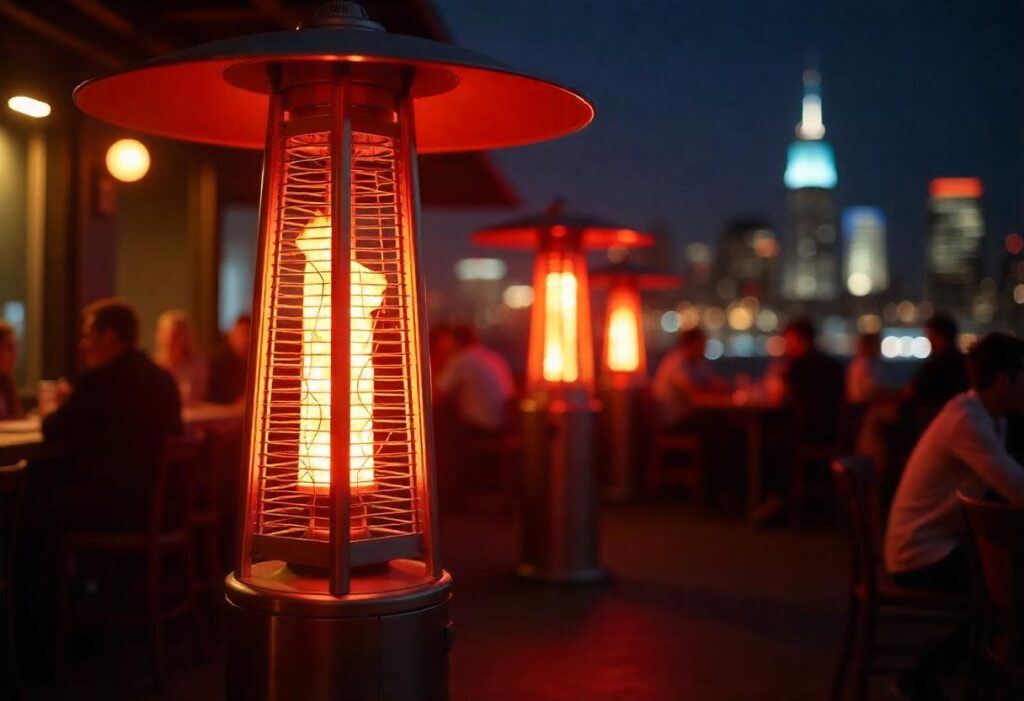Searching for a way to extend your living space and enjoy the outdoors, even on cool evenings? The trick is picking the right outdoor heater. And with choices ranging from powerful gas heaters to aesthetic electric models, the perfect fit is determined by your specific requirements regarding heat quality, installation, and safety. This guide will introduce you to the various types of outdoor heaters, giving you the information you need to make an informed decision and set up your yard, patio, or deck for warm times ahead.
Outdoor Heater Options
The ideal outdoor heater strikes a balance between the quality of heat, ease of installation, cost, and safety. Let us explain what type of heater you should choose for these and the best heater to use. Electric infrared or radiant heaters are the most effective heaters in a semi-enclosed space. Comes as wall or ceiling strips -Using infrared technology, it heats up instantly to provide direct heat with little heat loss, and those within the 1.5-3.0kW range are suitable for most home installations according to the size of the space.
Gas-aired, LPG, or natural gas, gas heaters are ideal in large, open, and well-ventilated areas that require rapid heating. Freestanding and pyramid options allow for versatile placement, and plumbed natural gas ensures a constant fuel supply. But they do come with higher running costs and more stringent safety measures, which means that they’re better for people using them in their gardens or for commercial use.
At the other end, environmentally conscious shoppers who fancy an atmosphere can buy bioethanol or wood-fire heaters instead, which are all flame and have low heating efficiency. Regulators advocate that fixed electric or plumbed-in gas systems are used in hospitality and public spaces to ensure compliance and mitigate the hazards of portable LPG cylinders.
-
Outdoor Propane Heaters
Outdoor Propane Heaters are particularly suitable around patios or in outdoor areas where there are no electrical outlets. Compact and mighty, they deliver results that match other outdoor heaters, simply at the push of a button. They generally feature adjustable heat settings and a straightforward push-button ignition, so they’re easy to use. Propane heaters connect to 20-pound propane tanks.
They produce heat from a burner that radiates heat across a designated area in square feet for a few hours, depending on how high the heat setting is. When dealing with large spaces, you will want models with high BTU measurements (30,000-50,000 BTUs). Safety features, such as auto-close shut-off valves and a tip-over switch, give you peace of mind.
-
Outdoor Electric Heaters
Outdoor Electric heaters won’t chew through your energy or your wallet-these babies are UL-listed for both indoor and outdoor use! These are available in different types: wall-mounted, ceiling-mounted, balanced flued, and freestanding – programmed to the required temperature and are completely silent. They generally consist of quartz or halogen heating elements that turn electricity into radiated heat.
Remote controls can be found on a variety of models, and more sophisticated models may include programmable timers or thermostats. Electric fireplaces are very energy-efficient, radiating heat at 99% and conversion rates of 10%. That will cut your winter energy bill.
-
Outdoor Infrared Heaters
Outdoor infrared heaters are designed to warm people and objects by direct heating technology for maximum efficiency. Quiet and pollution-free, they work indoors as well as outdoors. These heaters heat objects and surfaces directly, which in turn heats the surrounding air to the desired temperature, and most models are equipped with reflectors to help focus the heat where it is needed more efficiently. Infrared heaters are effective and heat exactly where you want them, so they’re best for smaller patios or around seating areas.
-
Outdoor Natural Gas Heaters
Natural gas patio heaters are perfect for permanently mounting or hooking up to your natural gas line, resulting in a lower overall cost. The fact that they connect to your home’s gas line means you don’t need to refuel them, and they provide a consistent heat source. There are heaters with burners attached to the gas line, and their ignition type ranges from manual to electronic. They are great for a big patio with heat out of over 50,000 BTUs. Professionals install natural gas heaters, which aren’t practical for renters, since you can’t move them easily when they’re already mounted.
-
Portable Heaters For Camping
Just as the perfect outdoor heater can magically turn your patio into a little cozy oasis, the same idea goes for when you’re camping beneath the stars. Camping heaters are specially designed so that you get steady heat in a remote, off-grid area, like a campground, with no electrical outlets and unpredictable weather.
These are generally propane-based heaters, so they are portable and boxless, with less expensive and more basic safety features, such as tip-over shut-off and oxygen sensing. They are perfect for use in a tent or near an open-air shelter. Suppose you’re prepping for a winter hiking trip. In that case, a cool overnight at a national park, or a brisk night of camping, choosing the best portable heaters for camping can mean the difference between an uncomfortable, restless night and a night where you truly enjoy being outdoors.
For an in-depth look at the best picks on the market and how to use them safely, check out our full guide to camping heaters.
How to Choose the Right Outdoor Heater for Your Patio
Choosing the right model will be a matter of matching power output, space covered, fuel type, weather resistance, and mounting style. Electric models are typically around 1,500–3,000 watts (larger units may need a separate circuit with RCD protection).
At a bid price of $0.30/kWh, a premium 2.4 kW unit will cost about $0.72 an hour to operate. Gas models come in BTUs for power, and are suitable for open spaces, but you’ll need good ventilation and safe cylinder storage.
Pay attention to ingress protection ratings — common ranges are from IP44 to IP65 — for resilience, and select according to your degree of exposure to the elements.
Wall‑mounted and ceiling‑mounted heaters are a boon, creating floor space and ensuring safe clearances above tables, while freestanding and portable outdoor heaters, including tabletop and pyramid styles, provide flexibility for renters and event organisers.
For the best performance, always follow the manufacturer’s recommendations about placement and height to ensure proper heat and safety.
Safety Tips for Outdoor Heaters
Adhere to these outdoor heater safety tips for a worry-free experience.
Placement: Never place a heater within 3 feet of anything flammable, like curtains, furniture, or plants. There should be plenty of overhead clearance to avoid heat damage to ceilings or awnings.
Ventilation: Always operate propane or natural gas heaters in well-ventilated spaces to avoid the buildup of carbon monoxide. Do not use these heaters in any enclosed or confined space without ventilation.
Sturdy: Set space heaters on a stable, flat surface to prevent them from tipping over. Several models feature weighted bases or integrated stabilizers for additional safety.
Maintenance: Hoses, connections, and fuel tanks should be inspected often for leaks or cracks. Inspect the burner and vents for any clogs that might interfere with your stove’s performance.
Monitoring: Never leave a heater unattended when in use, and never leave children or pets unsupervised in the same room with a heater. ALWAYS turn the heater off when not in use or before leaving the room.
Outdoor Heater Repair and Maintenance
Regular maintenance is necessary to extend your heater’s lifespan. If yours is faulty, it’s best to let the pros fix your outdoor heater. Common issues include:
Outdoor heater not starting: When the outdoor heater won’t ignite, a blocked burner, a broken igniter, or low fuel might be the cause. If this is cleaned and maintained, these issues can be avoided.
Heating Issues: This can be due to some accumulation on the heating element. You can clean the reflector and burner assembly to regain uniform heat spread.
Gas Leaks You Red: A hissing sound or smell of gas probably means a leak. Shut your heater off now, check that your hose is connected, and if the problem continues, contact a professional.
Electrical: In case of electric heaters, check for damage to power cords and connections. Replace any worn cords and make sure that the unit’s thermostat or control panel is working as it should.
Servicing: Regularly service the machine every year, inspecting all areas, including the burner and fuel lines, safety devices, etc. The heater can last longer and perform better with routine maintenance.
Find professional repair personnel who are specialists in outdoor heater repairs. Many manufacturers include warranties that provide for repairs; you’ll want to check the terms of your heater’s warranty.
FAQs
Yes, as long as they are certified for outdoor and installed with the recommended clearances and used in spaces that satisfy the definition of “outdoor area” in AS/NZS 5601.1. Gas units still need to be properly vented, and you should never run a heater indoors if it is certified for outdoor use only.
Store cylinders away from doorways at least one metre and always in accordance with AS/NZS 1596. Portable space heaters being used in public spaces must remain attended to and must stay out of reach of the public.
Lower‑power models plug into a standard socket, but many higher‑power units will need a dedicated circuit protected by RCD and properly earthed — you’ll need to call in an electrician for this.
Yes — many outdoor heaters are built to last against exposure to the elements, but the extent will vary by model. Many of them are rated with an IP (Ingress Protection) rating, which indicates how rain- and dust-resistant the heaters are.
Gas heaters are designed to withstand outdoor conditions as well, but the best way to ensure longevity and prevent rust is to cover them when not in use or store portable units under shelter. Your manufacturer’s recommendations will offer guidelines regarding weatherproofing.
No — you should never use outdoor gas heaters inside. They burn oxygen and give off toxic carbon monoxide, which can be deadly in confined rooms. Regulatory bodies like HSE (Health and Safety Executive (HSE)) and CDC advise against using patio heaters (LPG or gas) indoors in a home, marquee, or any closed area. Only use appliances indoors that are certified for indoor use.
That varies according to the type of heater and whether the garage is enclosed, partially open, or has adequate ventilation:
Gas heaters (LPG or natural gas): Not safe in garages, unless they are fully open and are ventilated, because of the risk of carbon monoxide.
Bioethanol/wood burners: What’s not recommended (bioethanol, wood?).Reasoning: The ventilation in garages is usually poor.
Electric infrared/radiant heaters: These are ideal for garages, provided the unit has a suitable IP rating and the outlet is safe to use.
Rule of thumb: gas heaters outdoors only in the open air, and electric heaters for semi-enclosed situations such as garages.
Conclusion: Warming Your Space, Your Way
From the understated power of an electric strip heater that hangs discreetly beneath a pergola, to the dramatic statement of an outdoor pyramid gas patio heater, our options for outdoor heat are as diverse as our climates and lifestyles. By learning the key varieties, matching them to your space and abiding by the local safety and compliance standards, you’ll be well-equipped to give your diners a warm, inviting experience year‑round — whether they’ve gathered for a peaceful night on the balcony or an alfresco service that’s doing a roaring trade.
You already have that outline: get the right fuel and format, size it correctly, and place it for comfort and safety. With that in place, you’re all set to delve through our connected buying guides and city‑specific resources to find an outdoor heater that will have your evenings last that little longer, your get-togethers that bit snugglier, and your spaces much more inviting.

